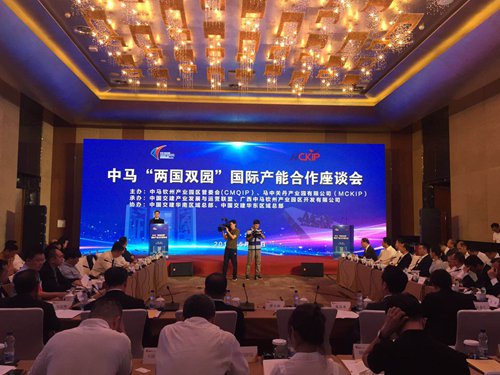Exemplar industrial park seeks upgrade, as Guangxi facility sees prospects amid warming China-Malaysia ties
By Wang Yi Source:Global Times Published: 2019/5/29 20:48:42
Guangxi facility sees prospects amid warming ties

The China-Malaysia Qinzhou Industrial Park signs a framework agreement with China Communications Construction Co in Beijing on Wednesday. Photo: Wang Yi/GT
The China-Malaysia Qinzhou Industrial Park (CMQIP), a demonstration project endorsed by both governments, aims to attract more technology enterprises and funds to upgrade the zone as the bilateral relationship warms up.
The park has an opportunity to make strides by using the complementary advantages of both sides, given that Malaysia and other economies are expanding trade with China amid the escalating China-US trade war, an expert said.
An industrial development and operation union under China Communications Construction Co (CCCC) signed a framework agreement with the CMQIP Wednesday in Beijing. The union is trying to attract leading companies in high technology, biomedicine and other sectors to the park.
Wen Gang, CCCC vice president, said after the signing ceremony that the platform is aiming to add value to companies at the CMQIP. Funds will also be introduced to the park to boost industrial growth.
Tan Pichuang, mayor of Qinzhou, South China's Guangxi Zhuang Autonomous Region, said after the ceremony that the city's key location in the New Land-Sea Corridor is a great advantage for companies.
The CMQIP, along with its sister park - the Malaysia-China Kuantan Industrial Park in eastern Malaysia - is known for its "two countries, twin parks" program.
The parks were endorsed as exemplar projects by both governments and the Joint Communique of the Leaders Roundtable of the Belt and Road Forum for International Cooperation in April.
After seven years of development, the CMQIP plans to develop into a so-called Version 2.0 in the coming years.
As a first-of-a-kind form of bilateral cooperation, the twin parks have many opportunities, Christopher Tang Choon We, a Malaysian partner with EY China, told the Global Times Wednesday.
"The two countries have complementary advantages," Tang said. "Malaysia has relatively lower labor costs and the will to draw support from China's technology advantage to develop.
"As the doubts of Malaysia's new government relative to China evaporate, the projects have fairly bright prospects," he added.
China and Malaysia resumed the East Coast Rail Link project in April, a move showing that Malaysia is seeking to play a more important role in the China-proposed Belt and Road Initiative.
However, questions are being raised by companies as to whether the park in southern China will help them to profit.
To attract leading companies, the CMQIP has provided incentives such as a corporate income tax rate as low as 9 percent. The park is also trying to attract more top financial-services entities.
Simon Li, general manager of Tus-Financial Service investment Co based in Beijing, told the Global Times Wednesday that his company is always following high-technology, innovative projects, and he is weighing whether to join CCCC's industry union to explore the park.
Newspaper headline: Exemplar park seeks upgrade
Posted in: ECONOMY,OTHER REGIONS